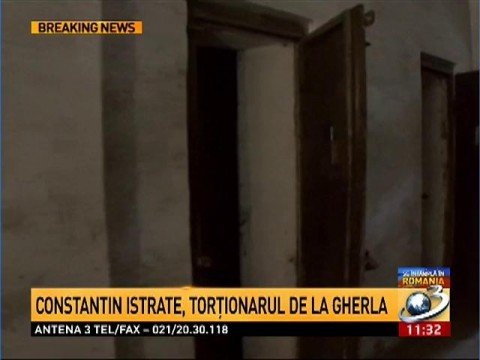Constantin Istrate (88 years) is the fourth torturer that the IICCMER has asked to be criminally prosecuted for committing crimes against humanity.
Previously IICCMER also asked prosecutors to investigate torturers Alexandru Vişinescu, Ioan Ficior and Florian Cormoş while in the case of Iuliu Sebestyen, who died in October 2013, the Institute presented the outcome of investigations.
The investigations carried out in recent months by IICMER identified some evidence indicating that lieutenant major (r) Constantin Istrate - who served as deputy commander for security and working arrangements at Colonia Onesti between December 1953 and May 1954 respectively Gherla Penitentiary from August 1957 - November 1958, March 1959 - October 19262, as well as the commander of the prison Gherla, from December 1958 to March 1959 - has committed crimes against humanity with the people admitted for administrative purposes and convicted persons in the execution of custodial sentences.
According to IICCMER Constantin Istrate imposed on the convicted an inhuman detention regimen that exceeded in intensity the limits provided by the organization and functioning of the General Directorate of Prisons.
This extremely tough regime applied in the two penitentiaries can be regarded as one of extermination in relation to the inhuman detention conditions responsible for the death of many prisoners. The detention regime was applied intentionally and upheld by Constantin Istrate and it can be characterized by lack of food, of medicines and medical care, abuse and by the large number of deaths, according to the source.
According to the documents evidencing the death of prisoners identified in the Archives of the National Administration of Penitentiaries, between December 1953 - May 1954, when lieutenant Constantin Istrate was deputy commander for security and working regime in the labor colony of Onesti, a prisoner died immediately after being transferred from Bacau.
Also, according to the official death certificates or documents evidencing the deaths of prisoners identified in the Archives of the National Administration of Penitentiaries, respectively Gherla Prison archive, the Archive of the National Council for Study of Securitate, the Archives in the Gherla Municipality, during the period from August 1, 1957 to 31 October 1962, and during the time Constantin Istrate was commander of the unit , 216 prisoners died, nine of them in the three months that he was in command.
In April 2013, IICCMER announced that it had identified numerous actions with criminal consequences perpetrated by 35 employees of the Directorate General of Prisons during the performance of their tenure in the period from 1950-1964. The investigated persons aged 81 to 99 years old live on the Romanian territory. However, IICCMER informed back then that they had the identification of names and exact addresses of the persons concerned.
The first case IICCMER presented, in July 2013, was that of Alexandru Vişinescu, former commander of the Ramnicu Sarat prison from 1956 until its abolition in 1963, the last chief of the prison during whose tenure peasant leader Ion Mihalache died after many years of torture. The Institute for the Investigation of Communist Crimes and the Memory of the Romanian Exile discovered that Vişinescu would be guilty of the deaths of 12 political prisoners. In the seven years that he managed the prison, Vişinescu established a regime of torture and terror. On June 18, 2014, the Prosecutor of the High Court of Cassation and Justice sent Alexandru Visinescu for trial for having committed crimes against humanity.
On September 18, 2013, IICCMER asked the Prosecuto of the Supreme Court to start criminal prosecution against the former commander of the labor colony Periprava retired colonel Ioan Ficior (85 years), also for genocide, crimes recently indicted as crimes against humanity in accordance with the provisions of the new Criminal Code.
On October 24, 2013, the Prosecutor of the Supreme Court announced that it had indicted Ioan Ficior who serving as commander and deputy commander positions, held in the period from 1958 to 1963, introduced and led a repressive abusive detention regime, inhumane and discretionary against political prisoners jailed in the Periprava Labor colony.
Prosecutors pointed out that due to the inhumane conditions in the Periprava labor colony (hunger, cold, daily beatings, lack of basic living conditions, failure to provide necessary medical conditions of sick prisoners), and work rules, impossible even for professional workers the number of deaths was very high, 103 deaths were recorded during 1958 and 1963, when the management of the establishment in the hands of Ioan Ficior.
On January 16, IICCMER presented the outcome of investigations into the case of lt. maj. (r) Iuliu Sebestyen, who died in October 2013, suspected of crimes and political abuses in the period he served as deputy for security and regime (January 1954 - December 1955) in Gherla Penitentiary. "Others who have held senior positions in the repressive system will be sent to court next period", stated IICCMER.
On February 11, 2014, IICCMER filed with the Prosecutor office attached to the High Court of Cassation and Justice, an accusation brought against Captain (r) Florian Cormoş for committing crimes against humanity, meaning that, in the virtue of the commander position he held between December 20, 1952 - April 17, 1953,he imposed an inhuman detention regime of the detainees in the Cernavoda labor colony.








